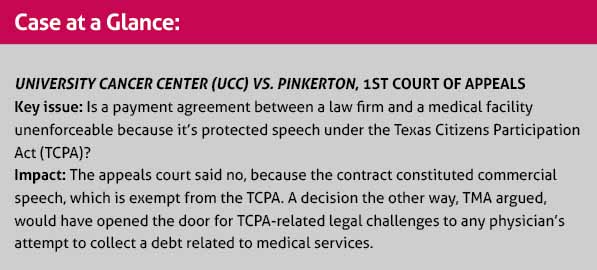
Imagine if you couldn’t take an organization to court to claim money it agreed, in writing, to pay you for patient care – because that written contract was considered “free speech” and couldn’t be the basis for a lawsuit.
If one of the (printable) words you would use to respond to that notion is “absurd,” you’re not alone. The Texas Medical Association is using that word to describe the defense a Houston law firm employed to deny its responsibility to pay University Cancer Center (UCC) for its services to the firm.
In 2010, UCC treated and screened hundreds of victims of the British Petroleum (BP) benzene release in Texas City. According to UCC, Pinkerton Law Firm, which represented the BP victims, agreed in writing to pay for those clients’ examinations once the firm resolved their lawsuits favorably against BP.
But despite receiving settlement money from BP on behalf of some of those clients, the firm never paid UCC in full, court documents say. After the cancer center sued Pinkerton for breach of contract, the firm claimed it couldn’t be sued because of a state law meant to protect Texans’ constitutional right to free speech. Essentially, Pinkerton claimed, its written promise to render payment was a protected First Amendment expression.
In January, with TMA’s urging through a friend-of-the-court brief, the 1st Court of Appeals rejected the firm’s bid to dismiss UCC’s lawsuit. TMA argued that upholding Pinkerton’s challenge would open the door for legal challenges on any attempt to collect a debt relating to medical services – and result in costly litigation for physicians.
“What physician wants to go and do medical work and then have the threat of a [contract being ruled invalid] over his head, where he then has to pay untold thousands of dollars … out of his pocket for an attorney to defend his contract?” radiation oncologist Mark D’Andrea, MD, medical director and CEO of UCC, told Texas Medicine.
In late February, the appeals court denied Pinkerton’s request to rehear the case.
Hundreds of patients, little payment
At the center of Pinkerton’s argument is the Texas Citizens Participation Act (TCPA). As the law states, TCPA was created in 2011 to encourage and safeguard the rights of people “to petition, speak freely, associate freely, and otherwise participate in government to the maximum extent permitted by law,” and to protect a person’s right to file a valid lawsuit “for demonstrable injury.” In short, it’s meant to stop lawsuits filed to muzzle people or groups.
But this case is not the first to raise questions about how that law is applied. Texans for Lawsuit Reform says on its website that TCPA “is unexpectedly being used to put an early end to all kinds of lawsuits that have nothing to do with safeguarding basic constitutional rights or protecting the rights of citizens to participate in government.”
That’s what TMA believes is happening in this case. The Pinkerton firm claims in court documents that TCPA should apply to the letter of protection – or payment agreement – it sent UCC. Both the cancer center and TMA are arguing that’s an illogical reach.
Pinkerton represented thousands of people who claimed they were exposed to benzene as a result of the BP spill and suffered complications such as dizziness, vomiting, and difficulty breathing, according to court documents. The firm sought medical testing and screening for those clients, and orally agreed to give UCC a $40 deposit per patient and a future payment arrangement for every client referred to the center, court documents say.
The center saw nearly 1,900 of Pinkerton’s clients between late August and early October 2010. That November, the firm “provided the center with a letter of protection intended to apply to all Pinkerton clients whom the center had seen,” the appeals court wrote. The letter, signed by attorney Chad Pinkerton, authorized UCC to “provide health care services for all of my clients listed on Attachment ‘A,’” a list that contained 952 clients. The letter said once litigation with BP was resolved favorably for Pinkerton’s clients, “your facility will receive payment for services rendered.”
But after Pinkerton notified UCC in 2017 that it reached a settlement with BP, it didn’t pay UCC in full, according to the cancer center’s court filings. UCC sued in an attempt to recover more than $3.7 million in charges for services it provided to 476 Pinkerton clients it treated who later settled with BP.
On Jan. 31, 2019, a Harris County District Court denied Pinkerton’s motion to dismiss the case on TCPA grounds. The firm quickly appealed.

The “free speech” defense
Mr. Pinkerton, who co-represents the firm, did not return phone and email messages from Texas Medicine seeking comment. But the firm’s appeal lays out its argument for why it believes the TCPA and free speech concerns apply.
Pinkerton argues “the lawsuit is based on, relates to, or is in response to [its] exercise of [its] right to free speech [or] right to petition.”
The TCPA defines “exercise of the right of free speech” as “a communication made in connection with a matter of public concern.” Pinkerton claims UCC’s lawsuit relates to communications made in connection with matters of public concern that include health and safety issues, economic well-being, and environmental concerns.
For example, the firm argues that because the contract agreement, and its statements that UCC references “further mention ‘health care services,’ ‘negative health impacts,’ or ‘toxic release of benzene,’ they also relate to the ‘health or safety’ of Pinkerton’s clients and qualify as ‘free speech.’ … Similarly, each statement relates to mass environmental contamination that caused 50,000 people to sue. Benzene exposure and mass-action settlements further implicate ‘environmental, economic, or community well-being,’ another variant of TCPA-defined ‘free speech.’”
UCC’s lawsuit contained statements from Pinkerton that “discuss, or at least relate to, prosecution or settlement of the benzene litigation and thus ‘pertain to a judicial proceeding,’” the firm’s appeal says, referencing the TCPA definition of “exercising the right to petition.”
If any of the law’s definitions fit, Pinkerton claims, “the TCPA may acquit. As a result, the TCPA often leads to dismissal of even ‘garden-variety’ claims, including breach of contract.”
In its rebuttals, UCC claimed the contract was commercial speech, which is exempt from lawsuit dismissal under the TCPA. Pinkerton told the appeals court that exemption didn’t apply, “because the intended audiences for Pinkerton’s statements – either UCC or a trial court – were not buyers of Pinkerton’s legal services.”
“Absurd” claims
In its June 2019 friend-of-the-court brief to the appeals court, TMA backstopped UCC, arguing that the Pinkerton firm didn’t show that the TCPA applied to this case.
TMA argued that the cancer center’s debt-collection suit wasn’t based on any communication Pinkerton made; rather, “Pinkerton’s liability is based on its inaction – it failed to pay the entire debt” it owed UCC. The cancer center’s legal action is an attempt to collect a debt and doesn’t “infringe on or restrict Pinkerton’s speech related to a matter of public concern,” TMA added.
“Pinkerton urges the court to apply an absurd interpretation of the TCPA that would not only deter physicians from assisting in personal injury cases, but also subject every debt-collection dispute to a TCPA motion to dismiss,” TMA wrote, adding that would lead to costly litigation.
Even if Pinkerton had established that UCC’s suit was in response to the firm’s exercise of free speech under TCPA, TMA backed up the cancer center’s argument that Pinkerton’s agreement to pay was TCPA-exempt commercial speech.
The firm’s “failure to pay the amount due for the medical services [UCC] provided to Pinkerton’s clients arose from a commercial transaction involving Pinkerton’s provision of legal services, i.e., the [payment agreement] and promises to pay [UCC] for its medical services from the settlement of funds,” TMA’s brief explained.
Concerns remain
On Jan. 9, 2020, the appeals court denied Pinkerton’s request to dismiss, meaning UCC can move forward with its lawsuit and try to get paid.
Justices rejected Pinkerton’s contention that “because it did not sell legal services to the center, opposing counsel, or the trial courts, the commercial-speech exemption” in TCPA doesn’t apply.
Pinkerton’s argument “disregards the fact that the business of selling legal services and the business of buying or selling other goods or services are not mutually exclusive activities,” Justice Gordon Goodman wrote. “Here, Pinkerton is alleged to have agreed to pay the center to screen Pinkerton’s clients and provide Pinkerton with the screening results. Nothing indicates that anyone other than Pinkerton had agreed to compensate the center for those services, and all communications relevant to the transaction occurred between Pinkerton and the center. With respect to the communications on which the claims are based, the center was the intended audience or recipient. As a result, the center satisfied its burden to show that the commercial-speech exemption applies here.”
But that hasn’t quelled concerns over misuse of the TCPA. Despite the victory, Lamar Treadwell, UCC’s attorney, said in a written statement to Texas Medicine that “too-liberal” enforcement of the TCPA has led to unintended consequences, and it’s up to lawmakers to stop that trend.
Writing generally about physician-attorney legal battles over these types of payment contracts, Mr. Treadwell said: “You now have the proverbial Dead Heat on a Merry-Go-Round of untenable delay and cost that may mean the end to the good faith that made [letters of protection] workable. Everyone loses, and the TCPA has caused economic harm to the medical and legal systems. … Only the Texas Legislature can fix this runaway law.”
Legal articles in Texas Medicine are intended to help physicians understand the law by providing legal information on selected topics. These articles are published with the understanding that TMA is not engaged in providing legal advice. When dealing with specific legal matters, readers should seek assistance from their attorneys.
Tex Med. 2020;116(4):27-29
April 2020 Texas Medicine Contents
Texas Medicine Main Page